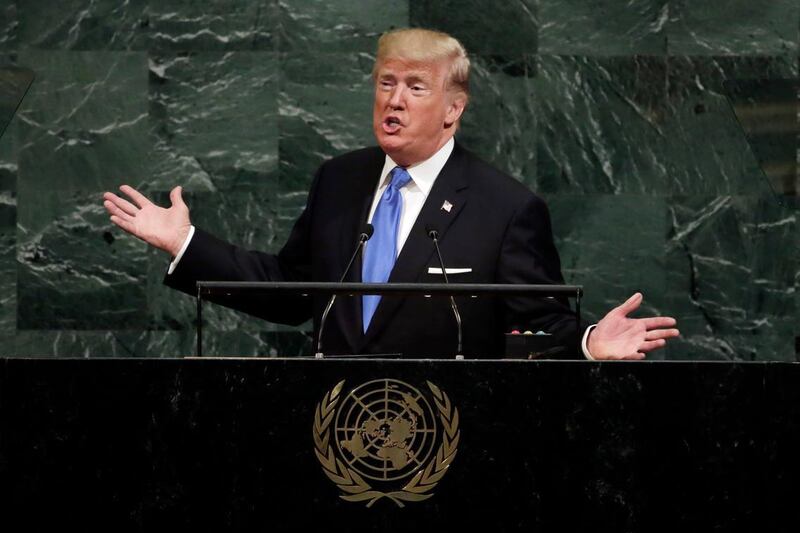On Tuesday, Donald Trump addressed the world for the very first time. Until then, the president of the United States had spoken about the world, but never directly to it. The 72nd session of the United Nations General Assembly offered him the opportunity to share his vision with other nations. There was, understandably, some trepidation among international delegations visiting Manhattan in the run-up to the occasion. Would the man elected to the US presidency on the platform of "America first" use his maiden speech before the General Assembly to announce America's withdrawal from the world?
Mr Trump allayed such anxieties by appearing alongside Antonio Guterres, the secretary general of the UN, on Monday and publicly throwing his weight behind the latter's ambitious reform agenda for the UN. And for all its populist flourishes, his speech the following day to the UNGA revealed a president who is not so much preparing to withdraw the US from the world as recast the nature of American engagement with it. Mr Trump affirmed the centrality of sovereignty in international affairs, rejected the US's habit of forcing its values on reluctant nations and eschewed the practice of nation building.
_______________
Read more
[ Trump blasts Iran deal, threatens to destroy North Korea in UN address ]
[ Russia and China snub Trump-Guterres meeting on UN reform ]
[ UN Postcard: Two leaders, two world views - can ever the twain meet? ]
_______________
To interpret any of this as a prelude to American isolationism is to overlook that fact that the speech was in fact premised on a desire for deeper engagement with the world – an arrangement in which America leads, but others too play their part. Critics who condemn Mr Trump’s threat to “totally destroy” North Korea as irresponsible are neglecting the fact that its purpose was to remind Russia and China, the two powers that back the rogue regime of Kim Jong-un, that their failure to restrain their client could have calamitous consequences.
On Iran, Mr Trump's clarity was in marked contrast to his predecessor's opacity. It is America's retreat from the region that bolstered Tehran's capacity to sow discord in the region, be it in the form of backing Houthi factions in Yemen or arming the murderous dictatorship of Bashar Al Assad in Syria. The nuclear deal enriched and emboldened its corrupt government while failing to moderate its malevolence. Mr Trump's pledge to pull out from the nuclear deal and hold Iran to account is a forceful reassertion of American leadership. By citing his visit to Saudi Arabia last year and highlighting the work being done by Riyadh's Gulf Arab partners to fight terrorism, he implicitly rebuked Qatar as an outlier in the family of "responsible nations".
As this newspaper has previously pointed out, putting "America first" is not contingent on cutting off relations with the world or even retreating from it. America's interests and global security and peace are not mutually exclusive. Mr Trump's loud and clear support for the modernisation of the UN to reflect current realities once again demonstrated that he appreciates and understands this fact. Mr Trump led the meeting. It was Russia and China that were missing from it.
Follow The National's Opinion section on Twitter





